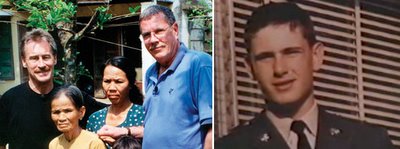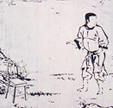A Few Good Men

Lawrence Colburn and Hugh Thompson (photo left) and Glenn Andreotta
Hugh Thompson was a helicopter pilot in Vietnam, flying a reconnaissance mission for a ground operation. His task was to draw fire so the enemy’s position would be exposed. But nothing happened. He and his crew — Lawrence Colburn and Glenn Andreotta, flew without incident, watching women and children leaving a village, apparently heading to the market. It was a quiet day.
It was so quiet that when they left to refuel, they did not request any backup. On their return to the village, however, they saw bodies on the roads and in the ditches. Many of the people they had seen leaving the area were dead or dying. The crew couldn’t figure out what had happened. There had been no artillery fire since early that morning; there had been no gunship fire and no enemy fire. They passed a wounded woman and marked her position with a smoke grenade, expecting medical assistance to arrive. But it was May 16, 1969, at My Lai. As they watched from above, a captain reached the woman, kicked her, stepped back, and shot her.
Landing by a ditch where dozens of people lay dead or dying, Thompson spoke to a soldier, telling him that those people had to be helped, that they had no weapons, that there were no draft age males among them, that they were clearly civilians. The soldier agreed; and as the helicopter lifted off, the soldier opened fire.
So when Thompson, Colburn, and Andreotta saw U.S. troops approaching a bunker where Vietnamese were hiding, Thompson landed between the bunker and the troops. A lieutenant said he was going to use grenades against the position, but Thompson had a better idea. He would get the people out. And “[i]f you fire on these people when I’m getting them out…my people will fire on you.” He called in a gunship to evacuate the Vietnamese.
Later that same day, Andreotta spotted movement in a ditch filled with bodies. The crew landed and rescued an eight-year-old boy.
In 1998, Thompson, Colburn, and Andreotta were awarded the Soldier’s Medal for their actions that day. Andreotta was not present because he was killed less than a month after My Lai. Thompson and Andreotta eventually returned to Vietnam where they met two of the women they had saved — and the boy, now a man, they had plucked from death.
One soldier, Lieutenant William Calley, stood trial for the massacre at My Lai. He was sentenced to life in prison. He spent three days in the stockade. President Nixon commuted the sentence to house arrest and granted a pardon three years later.
Hugh Thompson was interviewed for a 1998 documentary, “The Sound of the Violin in My Lai.” He said:
I’m just real sorry that my crew could not have done more. I’m extremely sorry for my fellow Americans for what happened. It wasn’t right. It wasn’t war. And I pray to God something like this never happens again.
Thompson died of cancer on January 6, 2006.
Ernest Johnson, Jr. was at a North Carolina military base when word of My Lai broke out. The massacre, the unrest at home, and the stories he heard from returning Marines convinced him that he could not go to Vietnam. He spent 37 years on the run. Using the name McQueen, he was living with his girl friend in Fort Worth when he was discovered and arrested for desertion. Johnson said, “I just decided I didn’t want to be a part of killing anybody. That’s as plain as I can say it.” Johnson faces the possibility of three years in prison.
Lawrence Colburn learned about Johnson in the course of an interview for Democracy Now. Colburn expressed a desire to contact Johnson.
And the war in Vietnam continues. Every year, hundreds of Vietnamese are killed or wounded by U.S. ordnance. A farmer uncovers an artillery shell, and it kills him. A child finds a canister from a cluster bomb, and it kills him. It is estimated that 300,000 tons of unexploded ordnance remain in Vietnam.
We have irradiated Iraq. We have dropped cluster bombs in cities all over the country. If we leave Iraq tomorrow, we will still be killing Iraqis for years to come. Victory is ours.
____________________
Labels: cluster bombs, Democracy Now, Glenn Andreotta, Hugh Thompson, Iraq, Lawrence Colburn, My Lai, Vietnam


0 Comments:
Post a Comment
<< Home